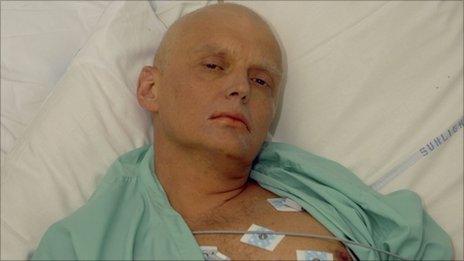Alexander Litvinenko: Profile of murdered Russian spy
- Published
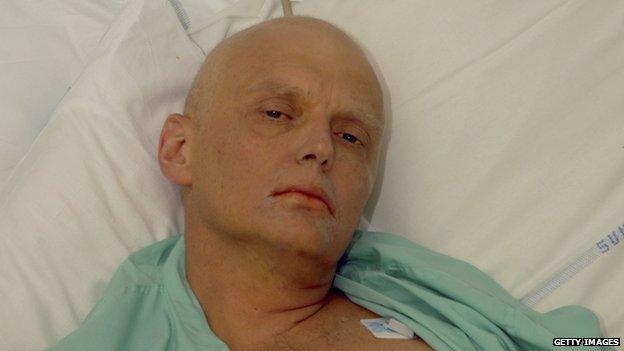
Alexander Litvinenko fell ill after a meeting with former KGB contacts in London in 2006
A public inquiry into the killing of former Russian spy Alexander Litvinenko has concluded that President Putin probably approved his assassination. But who was he and why did his death cause such controversy?
Former spy Alexander Litvinenko was killed in November 2006, leading to a clouding of relations between London and Moscow.
The 43-year-old had been an officer with the Federal Security Service (FSB), the successor to the KGB, but he fled to Britain where he became a fierce critic of the Kremlin. In his final years he also became a British citizen.
After he was killed by radioactive polonium-210, external, believed to have been administered in a cup of tea, it emerged the father-of-one was being paid by the British secret service MI6.
'Serious poisoning'
It is alleged Mr Litvinenko was investigating Spanish links to the Russian mafia and had planned to fly to Spain with former agent Andrei Lugovoi - the main suspect over his murder.
At a central London hotel on 1 November 2006, he took tea with Mr Lugovoi and Dmitri Kovtun, who was also a former Russian agent.
Mr Litvinenko fell ill soon afterwards and spent the night vomiting.
Three days later he was admitted to Barnet General Hospital in north London, where his condition gradually became a cause for concern.
On 11 November he was interviewed by the BBC Russian Service and said he was in "very bad shape" after a "serious poisoning".
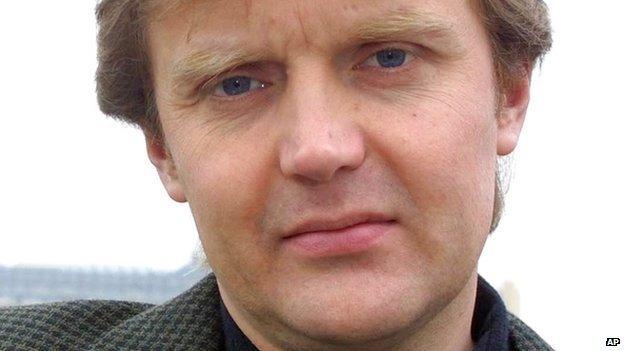
Mr Litvinenko had moved to the UK in 2000
During that same interview, Mr Litvinenko - a critic of the Putin regime - said he had been looking into the assassination of Russian journalist Anna Politkovskaya, who had received death threats before being shot at her Moscow apartment block the previous month.
On 17 November he was transferred to University College Hospital in London after his condition worsened.
He died six days later, with his wife Marina, father Walter, and son Anatoli at his bedside.
His widow has said he blamed the Kremlin as he lay dying in hospital, saying Russian President Vladimir Putin was responsible for "everything that happened to him". Russia denies any involvement.
Assassination plot claims
Born in the city of Voronezh in 1962, Mr Litvinenko joined a military unit of the Soviet Union's interior ministry in 1980 and reportedly joined the KGB eight years later.
He rose to the rank of lieutenant-colonel when the KGB became the FSB in the 1990s.
Mr Putin was his ultimate boss at the FSB but they reportedly fell out over corruption within the FSB.
In 1998, Mr Litvinenko was arrested on charges of abusing his office after exposing an alleged plot to assassinate Boris Berezovsky, the Russian tycoon who was found dead at his Ascot home in March 2013.
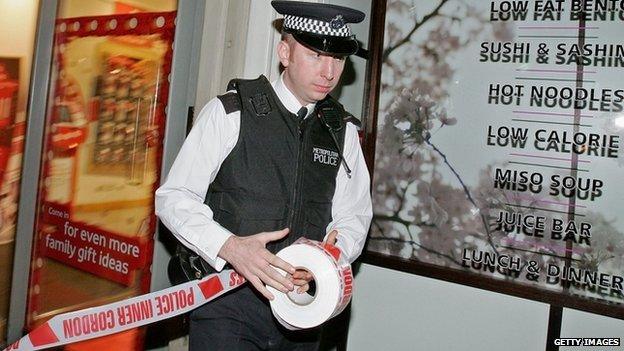
Police investigating the poisoning sealed off several premises, including this Itsu restaurant, for a period afterwards
He spent nine months in a remand centre before being acquitted.
After leaving the service Mr Litvinenko wrote a book, Blowing up Russia: Terror from Within, in which he claimed FSB agents had been responsible for the bombing of apartment blocks in Moscow and two other cities in 1999.
The bombings were blamed on Chechen separatists and his book claimed they were used as a pretext for the second Russian invasion of Chechnya.
Mr Litvinenko fled to the UK in 2000, claiming persecution, and was granted asylum. He is understood to have taken British citizenship in 2006.
After his death, suspicion fell on Mr Lugovoi and Mr Kovtun, the two Russians he had met for tea at the Millennium Hotel.
The inquiry into Mr Litvinenko's death heard that he may have also been poisoned with polonium in the October before he died, at an earlier meeting with the suspects at a private security firm in Mayfair, central London.

The Litvinenko case
23 Nov 2006 - Litvinenko dies three weeks after having tea with former agents Andrei Lugovoi and Dmitri Kovtun in London
24 Nov 2006 - His death is attributed to polonium-210
22 May 2007 - Britain's director of public prosecutions decides Mr Lugovoi should be charged with the murder of Mr Litvinenko
31 May 2007 - Mr Lugovoi denies any involvement in his death but says Mr Litvinenko was a British spy
5 Jul 2007 - Russia officially refuses to extradite Mr Lugovoi, saying its constitution does not allow it
May-June 2013 - Inquest into Mr Litvinenko's death delayed as coroner decides a public inquiry would be preferable, as it would be able to hear some evidence in secret
July 2013 - Ministers rule out public inquiry
Jan 2014 - Marina Litvinenko in High Court fight to force a public inquiry
11 Feb 2014 - High Court says the Home Office had been wrong to rule out an inquiry before the outcome of an inquest
July 2014 - Public inquiry announced by Home Office
January 2015 - Public inquiry begins

Home Office forensic pathologist Dr Nathaniel Cary said the post-mortem examination carried out on Mr Litvinenko's body had been correctly described as the "most dangerous... ever undertaken in the Western world". He and his colleagues had to wear white suits, protective gloves and specialised hoods with air pumped into them through a filter during the process.
Results of that examination suggested Mr Litvinenko had died after being poisoned with the radioactive substance polonium-210, external.
A frantic police investigation led to a number of premises being briefly sealed off while forensic scientists tested for traces of the radioactive material.
Locations which tested positive included the Millennium Hotel, the Abracadabra lap-dancing club and the Emirates football stadium, where Mr Lugovoi had watched Arsenal play CSKA Moscow.
It also emerged he had met Italian academic Mario Scaramella at an Itsu sushi restaurant in central London, where he is said to have received documents about the death of Mrs Politkovskaya, a long-term critic of the FSB.
Traces were also found on two planes at Heathrow Airport, at the British embassy in Moscow and at a flat in Hamburg, Germany, linked to Mr Kovtun.
Around 700 people had to be tested for radioactive poisoning but none of them was seriously ill.
Extradition denied
After a two-month investigation, Scotland Yard detectives handed over a file to the then director of public prosecutions, Sir Ken Macdonald, who announced in May 2007 that he was recommending Mr Lugovoi be charged with murder.
Mr Lugovoi and Mr Kovtun both denied any responsibility for the death.
At a news conference in Moscow, Mr Lugovoi repeatedly stressed his innocence and claimed Mr Litvinenko was a British spy who might have been killed by the British security services.
The office of the prosecutor general in Moscow was quick to declare that Mr Lugovoi could not and would not be extradited because the constitution prevented the extradition of Russian citizens.
In July 2007, British-Russian tensions turned into an ugly spat with four Russian and four British diplomats expelled from their respective embassies.
The UK broke off links with the Russian security services - although there was limited contact during the Sochi Winter Olympics.
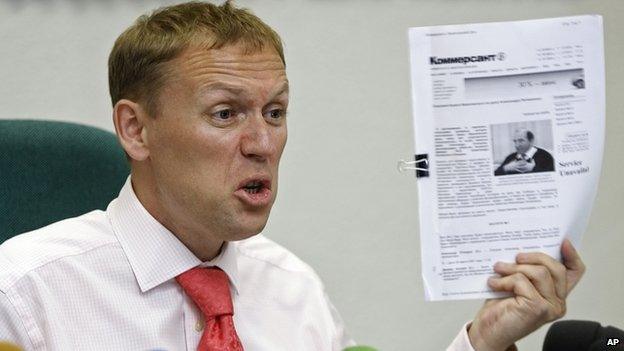
Andrei Lugovoi has denied any involvement and has accused the British security services
After a hard-fought legal battle by Mrs Litvinenko, a public inquiry took place.
The British government had originally rejected the idea of an inquiry, suggested by the coroner in charge of the case, Sir Robert Owen.
He had argued this was the only way of considering secret material that the government had demanded be kept out of the inquest. The material can be considered in closed session during an inquiry but not during an inquest - this includes material pointing to a possible role of the Russian state in the killing.
The inquiry, set up by the government, external, opened at the Royal Courts of Justice in London in January 2015, led by Sir Robert.
A year later, on 21 January, it reported its conclusion that Mr Litvinenko's murder was "probably" approved by President Putin.
Mrs Litvinenko said: "The words my husband spoke on his deathbed when he accused Mr Putin have been proved by an English court."
But the Russian government said the case had been "politicised" and had "overshadowed" relations between Russia and the UK.
- Published26 January 2015
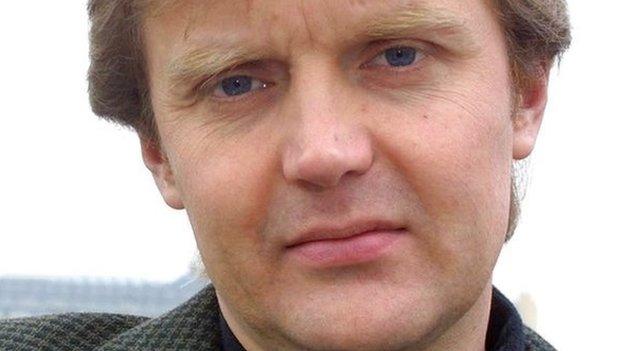
- Published20 September 2012
